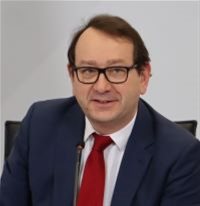European challenges at the heart of renewed territorial planning

Yves Le Breton, Director General National Agency for Territorial Cohesion, (ANCT) France
Few periods in the recent history of the European Union have witnessed so much upheaval within such a short period of time, which has called for embracing new strategies in addition to standard long-term road maps. These new strategies seem to be inherited from a distant, more gregarious past.
The Green Deal and its various environmental components seemed to be the backbone of the future resilience of our public policies, competitiveness and job creation objectives.
While the risks of the pandemic and armed conflicts regularly fed into foresight work, they did not seem sufficiently overpowering to the point of changing the course of the current political agenda until now.
The French presidency has chosen to place territorial issues at the heart of European debates. It drew on the wealth of evidence and data provided by the European Commission’s eighth report on economic, social and territorial cohesion to invite policy makers and stakeholders to analyse and reflect on the most appropriate ways to drive the ongoing demographic, digital and climatic transition forward
The conflict in Ukraine and the COVID-19 pandemic have rekindled the urgency of moving from minor tweaks to a more radical change of model on a great number of issues.
The conflict in Ukraine and the COVID-19 pandemic have rekindled the urgency of moving from minor tweaks to a more radical change of model on a great number of issues. Security of supplies – particularly of food, energy and pharmaceuticals – has moved beyond mere consideration of the limits of globalisation and the need for selected productive relocations; it has become an internal security priority. Europe is now aware that it cannot rely solely on the rest of the world to ensure its essential needs and, at the same time, abide by the global commitments of which it wants to be the figurehead. These two crises have reminded us of the very concrete nature of some of these issues, which were previously rather abstract for most citizens. From this perspective, they have boosted the Green Deal.
These issues all have a major impact on the management of our common public goods, foremost of which stands land management. The Green Deal had already put forward a development model that is more energy efficient; more respectful of biodiversity; and, through the ‘zero net land take’ objective, a better way of stewarding soil and land. In addition to the need to design more sustainable territories and cities, there is also a need to protect our agricultural land, to closely monitor energy security risks and to relocate the production of essential goods or those of major strategic interest. These combined requirements reinforce land-use constraints (and potential conflicts of use) and the need to accelerate the schedule for implementing the Green Deal.
The Green Deal and its various environmental components seemed to be the backbone of the future resilience of our public policies, competitiveness and job creation objectives
Ecologically anticipating and planning our future needs by rationalising land and resource use is strategic. It secures conditions that are conducive to more autonomous development, and also ensures a good quality of life for all European citizens.
This challenge cannot be met through regulatory constraints alone. It reiterates the need for strategic spatial planning no longer driven by growth imperatives, as it has been since the Second World War. Rather, it should be driven principally by local stakeholders’ awareness that more rational management of their territorial assets will be a key condition for their resilient and sustainable development in times of transition and consecutive crises.
Adopting a more human approach in our cities and modernising our countryside, while ensuring the more economical management of our territorial assets (e.g. natural resources, agriculture and forests), might seem simple objectives to share, but they are difficult to implement in practice.
This equation with several unknown variables will necessarily involve more densification and optimised use of public space, including, inter alia, better consideration of mobility needs. It will also involve more innovation: fairer, more sustainable, less energy-consuming urban developments are still the exception but must rapidly become mainstream.
These new urban models call for more balanced urban–rural relations based on the notion of ‘living together better’. Although rural areas have not yet had the means to raise the quality of their service provision to meet the population’s expectations, the pandemic might be a turning point, as it has seemingly increased the attractiveness of some parts of the countryside.
Sharing these issues and implementing them through a concerted articulation of bottom-up and top-down action frameworks is a major challenge in terms of multilevel public policy governance. This cannot be done without shared European and national strategic objectives, which, in turn, depend on the support of all regional and local authorities, and the population.
Learning from each other’s successful experiences all over Europe could be essential to achieving this common ambition that has been re-energised and augmented in recent months. This growing success of certain core priorities of the European Union’s project, including those reflected in the Green Deal, stems from the simple observation that, in the face of crises and major transitions, the best response is a European one, and we will thus be stronger together.